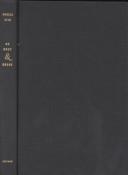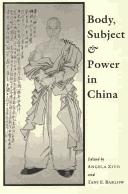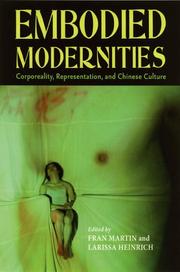| Listing 1 - 9 of 9 |
Sort by
|

ISBN: 0226987299 0226987280 Year: 1997 Publisher: Chicago (Ill.): University of Chicago press
Abstract | Keywords | Export | Availability | Bookmark
 Loading...
Loading...Choose an application
- Reference Manager
- EndNote
- RefWorks (Direct export to RefWorks)
The Qianlong emperor, who dominated the religious and political life of eighteenth-century China, was in turn dominated by elaborate ritual prescriptions. These texts determined what he wore and ate, how he moved, and above all how he performed the yearly Grand Sacrifices. In 'Of Body and Brush', Angela Zito offers a stunningly original analysis of the way ritualizing power was produced jointly by the throne and the official literati who dictated these prescriptions. Forging a critical cultural historical method that challenges traditional categories of Chinese studies, Zito shows for the first time that in their 'performance', the ritual texts embodied, literally, the metaphysics upon which imperial power rested. By combining rule through the brush (the production of ritual texts) with rule through the body (mandated performance), the throne both exhibited its power and attempted to control resistance to it. Bridging Chinese history, anthropology, religion, and performance and cultural studies, Zito brings an important new perspective to the human sciences in general.
S04/0690 --- S06/0205 --- S12/0340 --- S12/0216 --- China: History--Qing: 1644 - 1840 --- China: Politics and government--Government and political institutions: Qing --- China: Philosophy and Classics--Yili, Liji, Zhouli, Rites: general --- China: Philosophy and Classics--Political philosophy --- Imperialism. --- Rites and ceremonies --- China --- History --- Politics and government --- Imperialism --- Colonialism --- Empires --- Expansion (United States politics) --- Neocolonialism --- Political science --- Anti-imperialist movements --- Caesarism --- Chauvinism and jingoism --- Militarism

ISBN: 0226987272 0226987264 Year: 1994 Publisher: Chicago University of Chicago Press
Abstract | Keywords | Export | Availability | Bookmark
 Loading...
Loading...Choose an application
- Reference Manager
- EndNote
- RefWorks (Direct export to RefWorks)
Book
ISBN: 0824846818 0824846826 0824854314 0824868110 Year: 2015 Publisher: University of Hawai'i Press
Abstract | Keywords | Export | Availability | Bookmark
 Loading...
Loading...Choose an application
- Reference Manager
- EndNote
- RefWorks (Direct export to RefWorks)
Book

ISBN: 9780824854317 Year: 2015 Publisher: Honolulu
Abstract | Keywords | Export | Availability | Bookmark
 Loading...
Loading...Choose an application
- Reference Manager
- EndNote
- RefWorks (Direct export to RefWorks)
Book

ISBN: 9780824862329 Year: 2006 Publisher: Honolulu
Abstract | Keywords | Export | Availability | Bookmark
 Loading...
Loading...Choose an application
- Reference Manager
- EndNote
- RefWorks (Direct export to RefWorks)
Digital

ISBN: 9780824854317 9780824846817 Year: 2015 Publisher: Honolulu, Hawaii University of Hawaii Press
Abstract | Keywords | Export | Availability | Bookmark
 Loading...
Loading...Choose an application
- Reference Manager
- EndNote
- RefWorks (Direct export to RefWorks)


ISBN: 9780824862329 9780824829636 Year: 2006 Publisher: Honolulu, Hawaii University of Hawaii Press
Abstract | Keywords | Export | Availability | Bookmark
 Loading...
Loading...Choose an application
- Reference Manager
- EndNote
- RefWorks (Direct export to RefWorks)
Book

ISBN: 9780691234601 Year: 2021 Publisher: Princeton, NJ
Abstract | Keywords | Export | Availability | Bookmark
 Loading...
Loading...Choose an application
- Reference Manager
- EndNote
- RefWorks (Direct export to RefWorks)
Multi

ISBN: 9780691234601 Year: 2021 Publisher: Princeton, N.J. Princeton University Press
Abstract | Keywords | Export | Availability | Bookmark
 Loading...
Loading...Choose an application
- Reference Manager
- EndNote
- RefWorks (Direct export to RefWorks)
| Listing 1 - 9 of 9 |
Sort by
|

 Search
Search Feedback
Feedback About UniCat
About UniCat  Help
Help News
News